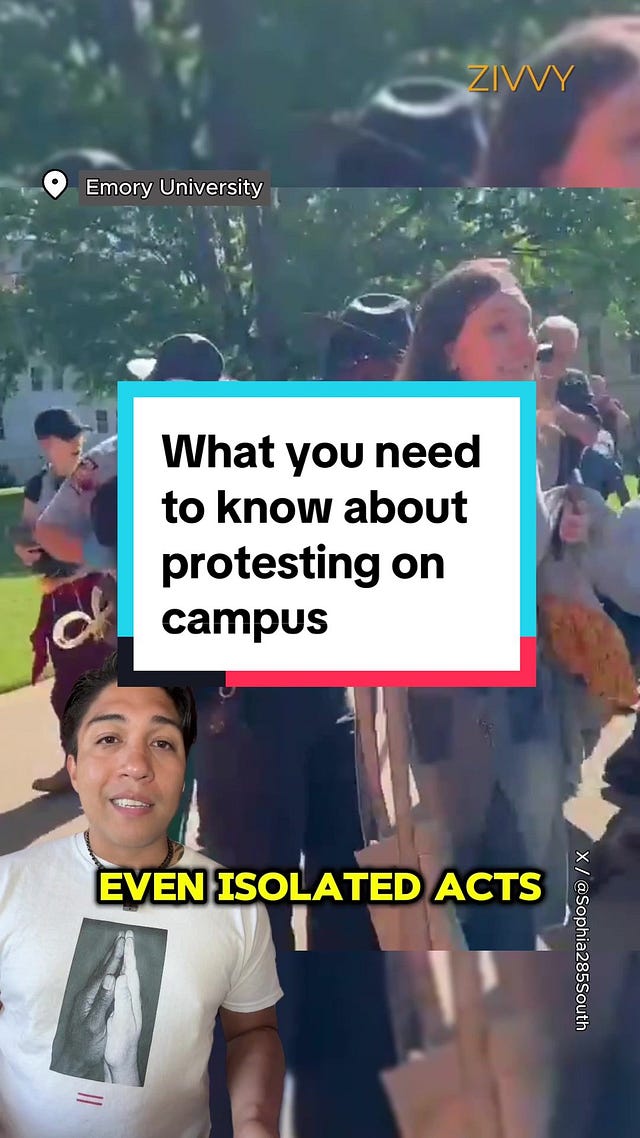✊ Could campus protests affect your chances of getting a job? 💼
Also: How some schools are negotiating with protesters and student-run media shines during protest coverage

As university campuses across the US continue to be epicenters of political and social unrest due to protests over the war in Gaza, the consequences are multifaceted—not just impacting the school year, but prospective students’ school choices, graduates’ employment prospects, financial stability, and institutional reputations.
After this week’s violent protests, Columbia University announced all final exams and academic activities would be remote for the rest of the semester, the Columbia Spectator, the university's student newspaper reported. Other schools, including the University of Southern California, canceled commencement ceremonies due to the protests.
Some students and their families are reconsidering their university choices. Administrative responses to heightened tensions and antisemitic incidents at colleges like Columbia University are leading students to consider institutions perceived as safer and more aligned with their personal safety needs and values.
Not only could protestors lose future job offers, but simply going to a college where protests took place could affect students’ ability to seek employment after graduation.
The reputation of Ivy League schools among employers is also at stake. The same qualities that once elevated these institutions—selectivity and a heralded ability to cultivate leaders—are now scrutinized under the lens of current campus climates, which some critics argue foster divisiveness rather than constructive dialogue. According to a Forbes survey, there is a growing reluctance among employers to hire graduates from Ivy League schools, which they now view as overly focused on activism at the expense of practical skills and balanced perspectives.
Beyond admissions and hiring impacts, the protests might influence university funding. Historical parallels drawn from the 1960s suggest that significant campus unrest led to reductions in state funding and shifts in public opinion that could threaten modern universities' financial stability. Today, with both state and federal lawmakers scrutinizing the role of universities in managing protests and maintaining campus order, funding cuts loom as a potential repercussion for institutions embroiled in controversy.
SEE ALSO: They entered college in isolation and leave among protests: The class that missed out on fun (WSJ)
📸 A nationwide snapshot of college protests
According to the AP, more than 2,000 people have been arrested over the last two weeks in campus protests across the US.
The Washington Post analyzed data from the Crowd Counting Consortium, a joint effort from Harvard Kennedy School and University of Connecticut, to create maps showing the stunning growth of pro-Palestinian protests at colleges across the country.

The Washington Post also has a thorough roundup of protests and arrests at more than 28 different schools.
How each school is handling these protests differ widely. Many universities are turning to police to arrest protesters, with many being barred from campus and students even facing suspensions and expulsions. Though other schools are trying to negotiate and find peaceful solutions.
The student-run Daily Northwestern reports that Northwestern University officials reached an agreement with protesters, allowing them to demonstrate on campus through June 1, while promising additional support for Muslim, Middle Eastern and Palestinian students and faculty in exchange for only allowing one tent on campus, and the removal of all non-university affiliated individuals from events.
University of Southern California President Carol Folt has been sitting down with encampment organizers to negotiate, but after the second meeting, the Daily Trojan reports on Instagram that progress has not yet been made.
While mainstream media remains focused on the protests—they often don’t have as much access as student-run publications, many of which have become go-to sources for real-time updates of the ongoing events.
One shining star has been Columbia University radio station WKCR, which broadcast live updates during the NYPD raid on a school building taken over by protesters.
Here’s a short list of some of the many student-run publications dedicated to covering the protests on their respective campuses.
UCLA’s The Daily Bruin
USC’s Daily Trojan
UT Austin’s The Daily Texan
University of Wisconsin Madison’s Badger Herald and Daily Cardinal
University of South Florida’s The Oracle
Fordham’s The Observer and The Fordham Ram
University of Minnesota’s The Minnesota Daily
Emerson College’s The Berkeley Beacon
DIG DEEPER:
Know your rights and responsibilities when protesting on campus (Zivvy News on TikTok and Instagram)
Why Gaza protests on college campuses have become so contagious (NYT)
A crash course on Protesting 101 (Oh My World Show on Instagram)
Universities are missing an opportunity to foster understanding and discourse (Cosmopolitics)
🗞️ In other News
👨🍳 World Central Kitchen resumes operations in Gaza
The aid group World Central Kitchen resumed operations in Gaza, less than a month after seven of its staff were killed in Israeli airstrikes. (NPR)
In an op-ed in the Washington Post, founder Jose Andres called on Israeli forces to “step up” to let humanitarian groups do their work.
🇺🇸 Politics
🗳️ Why isn’t RFK Jr.’s own family endorsing him for president?
Robert F. Kennedy, Jr. is running for president as an independent candidate. Why isn’t his own family endorsing him? (Zivvy News on Instagram and TikTok)
📜 Arizona Senate repeals near-total Civil War abortion ban
The Arizona Senate voted on Wednesday to repeal the state's 1864 near-total ban on abortion, which could otherwise have taken effect within weeks. Two Republican senators crossed party lines to vote in favor of repealing the ban. (CNN)
RELATED: In Idaho case, Supreme Court appears split on if states can prevent hospitals from providing abortions in medical emergencies (The 19th)
🗳️ Latino voters are coveted by both major parties. They also are a target for election misinformation
In Arizona, an important swing state, one radio network is leading an effort to empower Latino voters by discussing election misinformation and fact-checking conspiracy theories on air. (AP)
⚕️Health and wellness
🧛 How 'vampire facials' infected three women with HIV
A recent report on women who contracted HIV after receiving a "vampire facial" has raised questions about the safety of some cosmetic procedures. (BBC)
😴 Sexsomnia: An embarrassing sleep disorder no one wants to talk about
Sleep sex, or sexsomnia, is part of a family of sleep disorders called parasomnias that include sleepwalking, sleep talking, sleep eating and sleep terrors. (CNN)
🔦 Gen Z in the Spotlight
⭐ Mari Copeny Is More Than Little Miss Flint: An Activist Grows Up
At 8, Mari Copeny gained global recognition for raising awareness about the Flint Water Crisis. Now 16, she talks about growing up in the spotlight and coming into her own. (Teen Vogue)
Thanks for reading!
We are looking forward to hearing from you as we build our community. Reply to this email, drop us a note here, or slide into our DMs on Substack with your thoughts. And don’t forget to follow us on Instagram and TikTok for more news.

















Hannah Idiot Slutsky did more to ruin the reputation of graduate liberal arts programs at Columbia than the entire so called protest movement.